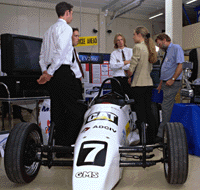Final Year Undergraduate Projects
The final year project is considered to be an important part of the engineering education process and projects sponsored by local industry are very welcome. In the past many companies have benefited considerably from technology developed as part of a final year project. Althought the projects normally require a minimum of 300 hours of student time, many students spend up to 600 hours. Students work in teams range in size from one to three.
There are two ways in which companies may be invlolved in final year projects. The first is through the Project Plus program run by the Industry Linked Education, Office of Industry Liason. This program involves up to 600 hours of student time, supervision by an academic staff member and management by the Office of Industry Liason. The project management involves regular meetings and monitoring of student progress to ensure that the project remains on schedule. Normally only one student works on the project and is paid a stipend of $4000 (a great boost to student motivation), based on the attainment of certain goals. The total cost to industry for this program is $8000 and the student works from the beginning of March to the end of October on the project, including vacation time in June/July. In some cases it is possible to arrange for the student tostart early and work with the company in December to February period prior to the official project period, thus allowing the student to get a head start.
The second way that companies may be involved is less structured than the first in terms of project management. Students work in groups of 2 or 3 from the beginning of March until the end of October and may be expected to spend 300 to 400 hours on the project. The project is supervised by a member of academic staff and the students are not paid a stipend. An upfront fee of $250 to cover incidental expenses is charged. If both the company and the academic supervisor agree that the project has met specified goals, a further payment to the School of Mechanical Engineering of $2500 is required at the completion of the project.
For both types of sponsorship, costs of production of substantial items of test equipment must be met by the company. However, equipment already available in the School can generally be used for the project free of charge provided that certain guidelines are met.
There is a project exhibition in early November and this is characterised by intense and enthusiastic competition for the few (but lucrative) prizes for excellence that are sponsored by local industry.
To see lists of the current and previous final year projects, press here.
Business and Industry
|



